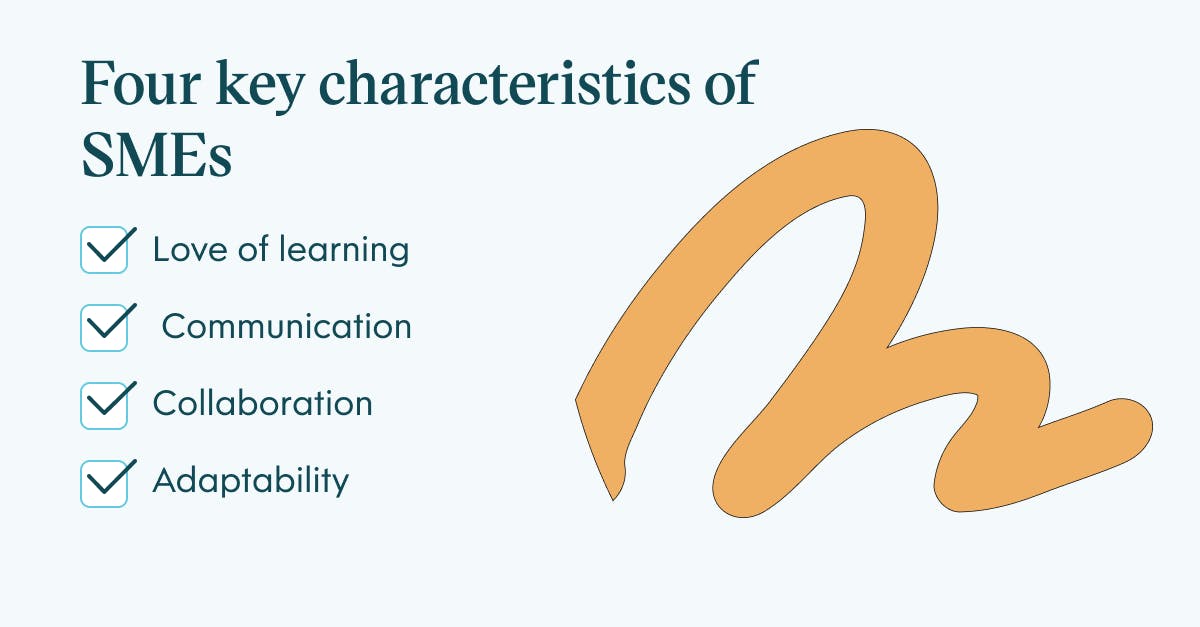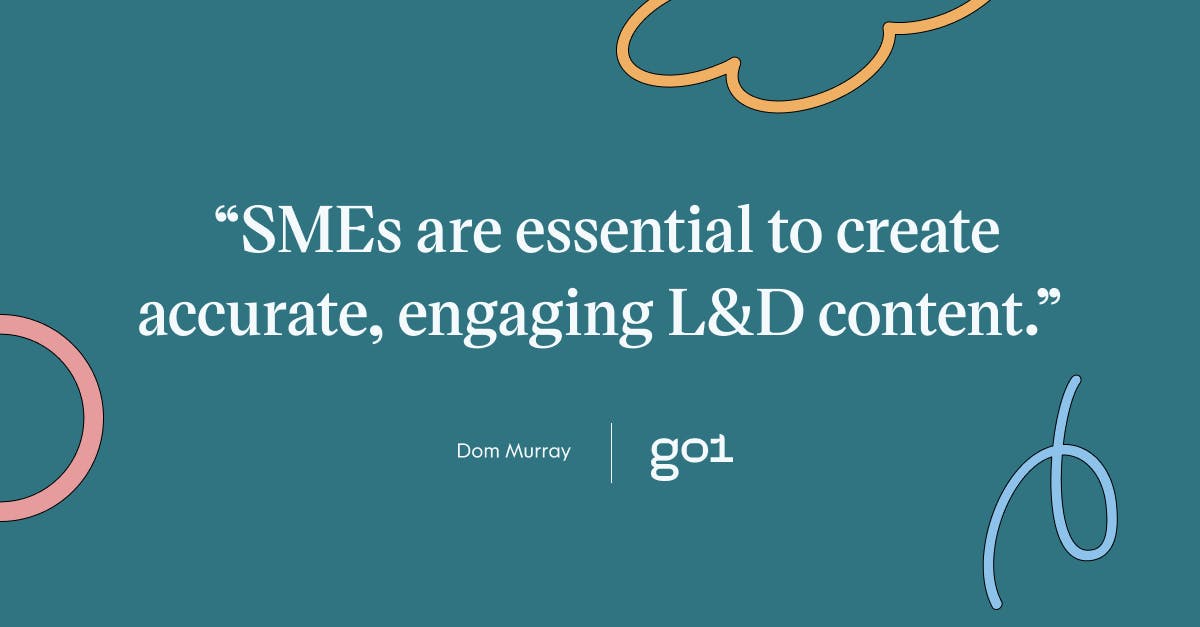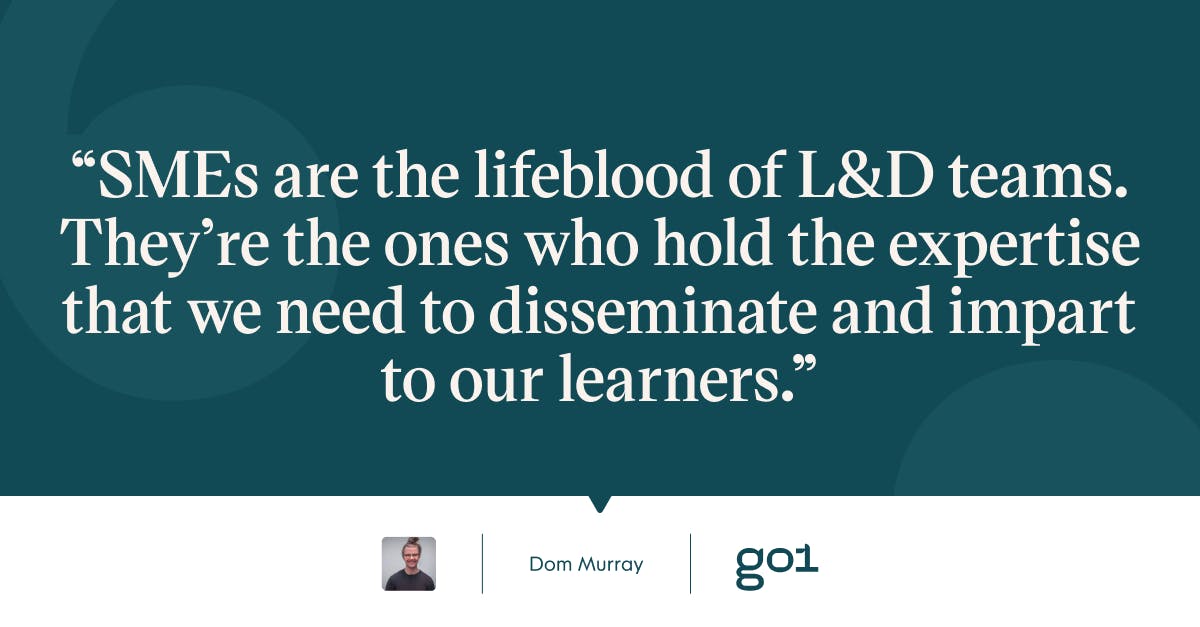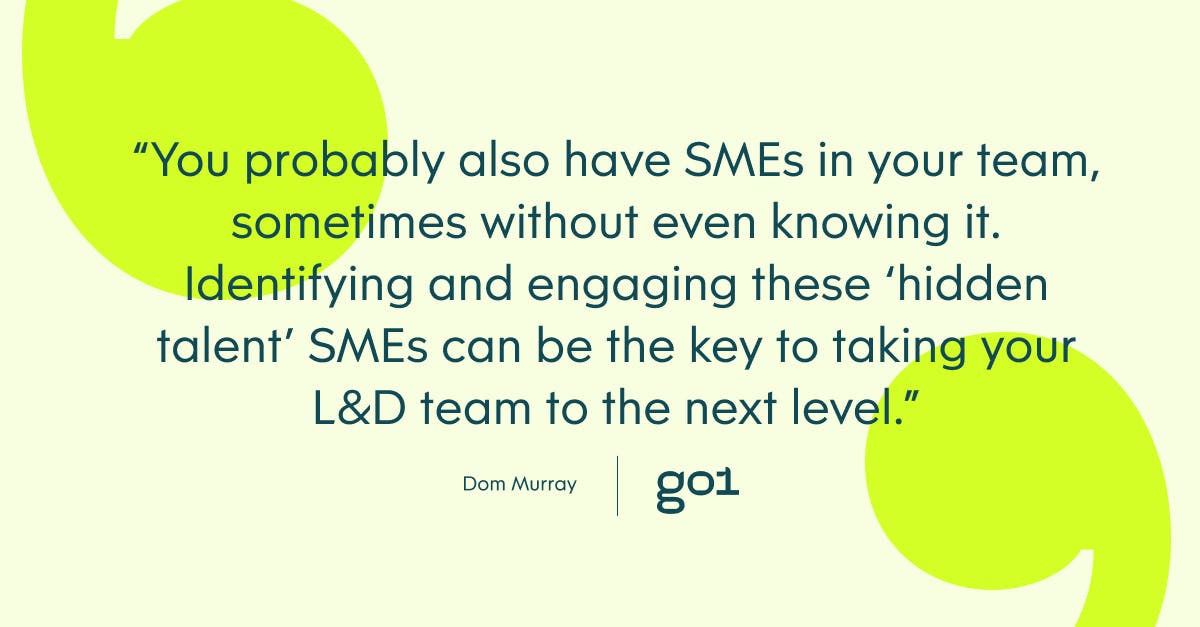
What is a Subject Matter Expert (SME) for L&D?

If you’ve spent enough time in the learning and development sphere, you’ve likely come across the acronym SME. Add it to the long list of L&D jargon. SME stands for Subject Matter Expert, used to refer to someone who is an expert or thought leader in their field. While many of us probably like to think we’re experts, those select few who truly earn the title of Subject Matter Expert are incredibly valuable in the L&D world. As such, SMEs are in high demand in 2022.
At Go1, our thirst for knowledge is never truly quenched, meaning we love SMEs. So, we thought now was the perfect time to explore the ins and outs of subject matter expertise. We’ll start by defining SMEs, before moving on to the key characteristics of SMEs, the significance of SMEs for L&D, and tips on identifying and engaging SMEs in your team.
Ready to become an expert on Subject Matter Experts? Start here.
What is an SME?
In L&D, SME stands for subject matter expert. As the name suggests, an SME is someone with a high level of knowledge and expertise on a certain subject (or subjects). This acronym shouldn’t be confused with the other common definition of SME, meaning small-to-medium enterprise.
As eLearning Heroes explains, “SME is really just a fancy way of describing someone who is an expert in his or her field. It’s the person in an organisation who has the most knowledge or skill in a specific topic.”
Or, as Indeed puts it, “[SMEs] are professionals who have advanced knowledge in a specific field. As an authority in a particular area or topic, they are uniquely qualified to provide guidance and strategy. SMEs are especially in high demand in workplaces requiring a technical approach to operations and culture.”
Put simply, SMEs can be anyone with a high degree of knowledge in a particular field, from a new hire in accounting to an expert witness in a high-profile court case. You probably have several subject matter experts in your team — perhaps without even realising it! After all, most people have a few specialist subjects. You just need to find their areas of expertise to unlock a well of wisdom.
As Indeed’s definition alludes to, SMEs are particularly valuable in workplaces that require highly-specialised knowledge. For example, if you need to create a learning module on developing workplace cultures but don’t know the first thing about the subject matter, you would generally turn to an SME. This example applies to almost any learning course where you are unfamiliar with the subject matter, which is why SMEs are in such high demand in L&D.
Other examples where SMEs might come in handy include: you could be researching a historical novel and turn to an expert to ensure you have the most accurate information. Or, you might open a new jewellery shop and hire a digital marketing SME to help with your SEO. Basically, SMEs are used across industries, from law and human resources to architecture and customer support and everything in between. Any time you need specialised, technical knowledge, an SME is likely to follow.
To summarise, SMEs come in handy in any scenario where you are asked to complete a task but are unfamiliar with the particulars of the subject matter.
Skills required to be an SME

Now that we understand what SMEs are, it’s worth analysing the skills that set SMEs apart. Obviously, being an SME is predicated on broad expertise in a particular field. However, we’ve identified four additional traits that make successful SMEs stand out:
4 key characteristics of SMEs
1. Love of learning
A love of learning is arguably the most valuable characteristic of any Subject Matter Expert. A thirst for knowledge and continuous, lifelong learning keeps SMEs at the cutting edge in their area of expertise, continually adding to their deep well of knowledge.
2. Communication skills
It’s excellent to be a fountain of knowledge in a particular field, but communicating your knowledge to others is equally important. As such, well-developed communication skills are vital for SMEs to share their wisdom with stakeholders.
3. Collaboration
Going hand in hand with communication skills, collaboration is also essential for successful SMEs. Examples include guiding team members in their content planning and creation, openly sharing knowledge and experience, and actively participating in course development and other projects.
4. Adaptability
As a subject matter expert, you likely have a vast well of knowledge. But parsing that knowledge to share only the most relevant aspects requires adaptability. Therefore, thinking quickly on your feet and adapting your expertise to fit different briefs and situations is essential for successful SMEs.
What is the significance of SMEs for L&D?
Now that we’ve defined what it takes to be an SME, it’s worth asking, what is the significance of SMEs for L&D? SMEs are essential to create accurate, engaging L&D content. Given the breadth of topics L&D professionals have to cover, it is almost impossible to be an expert in everything. Enter, SMEs.

As Training Industry explains, “since we don’t have the ability to read minds, enabling us to learn quickly from experts, we must settle for subject matter experts (SMEs), who can help us understand what employees need to learn to reach the desired outcomes and how to sequence that training effectively.”
Picture this: you have to create three learning modules; one on compliance training in the construction industry, one on upskilling a remote team, and one on mental health and wellbeing. While you might have a basic understanding of each of these topics, it is unlikely that you are an expert in all three. So, you turn to Subject Matter Experts in each area and lean on their knowledge to ensure the content you create is accurate, in-depth, and engaging. As eLearning Industry puts it, the primary role of an SME is to be “the main source of knowledge. They’re the person everyone on the team turns to for clarification and insider expertise.”
Or, as Dashe & Thompson say, “leveraging subject matter experts is one of the best ways you can ensure the information you are providing to learners is accurate, effective, and impactful.”

As a result, SMEs are the lifeblood of L&D teams. They’re the ones who hold the expertise that we need to disseminate and impart to our learners. Without SMEs, many L&D teams would be grasping at straws, unable to fulfil specialised content requests.
How to identify and engage SMEs in your team
Often, organisations engage external Subject Matter Experts and thought-leaders for projects. However, as mentioned, you probably also have SMEs in your team, sometimes without even knowing it. Identifying and engaging these ‘hidden talent’ SMEs can be the key to taking your L&D team to the next level. For instance, you might discover your HR leader is also an SEO expert, or someone in accounting is familiar with compliance regulations in a specific sector, thanks to a previous job.

There are many ways to identify SMEs in your team. Although, it can often be as simple as striking up a conversation, finding the subjects people are most passionate about, and letting them talk. You'll probably learn something new.
From there, it is a matter of engaging your SMEs and translating their knowledge into high-quality learning content. There are several ways to approach this process. A few tips include:
- Set goals from the outset and offer your SME a clear structure (establish expectations and deadlines, decide on ways to track progress etc.)
- Communicate the key learning objectives of your training program
- Develop an ongoing relationship with your SME
- Open a clear line of communication and ask lots of questions
- Avoid L&D jargon and acronyms your SME may be unfamiliar with
- Offer your SME the right level of support — remember, they might be a Subject Matter Expert, but that doesn’t mean they’re necessarily an expert at creating learning content
- Give examples of high-quality L&D modules to shape their expectations and understanding of what you’re looking for
- Value your SME’s time and show appreciation for their expertise
Finally, above all else, practice your active listening skills to ensure you’re not missing any crucial pearls of wisdom. According to eLearning industry, active listening is your best friend when working with SMEs. As they explain, “reflect on what they are telling you and ask them specific questions about their material: Why did they choose these particular images? What are the design elements in their presentations that they like the most? How do they feel about converting their case studies into engaging, fascinating, interactive eLearning experiences? Show interest in your Subject Matter Experts’ work and make sure that it is clear you respect where they are coming from.”
In other words, SMEs are indispensable to a successful L&D program, so be sure to treat them as such. Next time you need to create a piece of learning content, remember the manifold benefits of engaging an SME.
For more insights, be sure to subscribe to the Go1 newsletter to stay on top of all the latest L&D trends. Or, you can book a demo today to find out how Go1 can help with your team’s learning needs.




